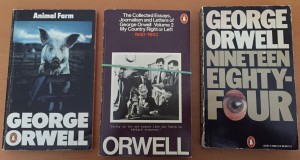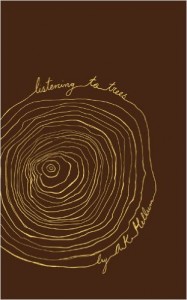An American writer recently advised me not to write politically. I thought, “Surely, I have misheard.” (Truth be told, I actually thought “WTF,” but I’m granting myself a better vocabulary in the retelling). The context was a conversation about the upcoming American election. I had asked what role he thought writers had in the mess. None, he said. Political writing makes for bad art, he said. I countered with Orwell. He said “British,” and thus dismissed my point. I visualized George Orwell rolling over in his grave but I think Orwell would dislike the image. He would probably call it overused, which it is. It is also unclear. It is meant to imply anger and restlessness but could just as easily imply resignation. Roll over, pull the shroud up over your shoulder and ignore it. So instead, I’ll visualize Orwell pushing against the lid of his coffin, desperate to get a word in on this argument. I countered again with Steinbeck. The American writer said, “A different time.” He warned me I could have no commercial success writing politically. As I was about to list a host of contemporary American fiction writers whose work is both political and successful, the real issue came out. He had written something political on social media and lost friends. Sometimes, we are simply afraid.
Writing I love is always political. It has a high likelihood of offending someone. If George Orwell were alive today, I suspect that he would have something to say about the current nominees, both Republican and Democrat. He might write an essay. He might write a work of fiction which touches on the problems of the present. I doubt he would have held back.
Orwell would have braved the haters and the internet trolls and the columnists from Nowheresville who resort to ad hominem attacks and straw man arguments. It would have been a thing to behold. We need Orwell now. But Orwell is dead. The best we can do is strive to be like him.
In Orwell’s essay “Politics and the English Language,” he writes, “In our age there is no such thing as ‘keeping out of politics.’ All issues are political issues” and I couldn’t agree more. Most people know this particular essay as the source of excellent writerly advice like using clear language and avoiding spent metaphors. He laments that “our thoughts are foolish, but the slovenliness of our language makes it easier for us to have foolish thoughts.” Lazy and inaccurate language begets lazy and inaccurate thinking and in turn, lazy and inaccurate thinking begets lazy and inaccurate language. We must break this cycle, and Orwell suggests paying attention to language is a good place to start.
Orwell would demand a specific example. Here is one. Mr. Kasich, a Republican, is described as “moderate.” Moderate is a political label that has become meaningless, just as Orwell notes the word “democracy” has become meaningless. Its use here is inaccurate and lazy. Moderate compared to what? Please, define your terms. The word moderate is being used to imply Kasich is “good” or that, less optimistically, he is the “best of a bad lot” or, perhaps, “not quite as crazy as the others.” But recall the reciprocal nature of the relationship between language and ideas. If, as a result of numerous namings of Kasich as a moderate, Americans visualize him when the word is used, we will have succeeded in further confusing the meaning of moderate. To reverse the process, he must be called what he really is.
But why single out Mr. Kasich? Many have argued that, in fact, the Republican candidates are all saying much the same thing. They each espouse racist and xenophobic ideas. Mr. Trump is not an outlier, not within the candidates, the Republican party, or possibly even the American people. Sure, some of the candidates, like Mr. Trump, appeal more to the KKK than others. But that doesn’t mean that the others do not appeal to the KKK. Ironically, in between the bluster and incomprehensible phrases of jingoistic nonsense he has pushed together to create his campaign, he has done something that Orwell would advise. On select ideas, he has removed the mask of codified language, pretentious diction, and economic and legalistic jargon that has long obfuscated the hobbesian brutality of Republican goals. (Orwell would hate that sentence. How about this: Regarding race and immigration, he has been explicit and revealed the brutal end game of Republican policy.) As a result, his audience has found him and responded accordingly and he is winning. Unfortunately, the language he uses still comes from failed thinking.
It was 1946 when Orwell wrote “the present political chaos is connected with the decay of language,” and this statement is equally true in 2016, seventy years later. His essay teaches all writers how to avoid spouting the meaningless drivel that inundates us in every news cycle. And it is well past time that we as writers use his suggestions. We must explain how these candidates defy the American Constitution and demean the American dream. Or rather, YOU must, American writers. It’s your country. Do so clearly, explicitly, using clear language and specific examples. Orwell promises that if you write in this style your thoughts will become clearer and “when you make a stupid remark its stupidity will be obvious, even to yourself.”
I revisit Orwell’s writing often, particularly The Collected Essays, Journalism and Letters of George Orwell. I happen to have Volume 2, conveniently subtitled My Country Right or Left, 1940-1943. It is old and held together with an elastic. My copy originally belonged to my older brother. It was one of his high school texts, and somehow, I have come to have it. The passages that he checked off in the index include “Review of Mein Kampf by Adolf HItler,” “Review of The Totalitarian Enemy by Franz Borkenau,” “Prophecies of Fascism,” “Literature and Totalitarianism,” and “Who are the War Criminals?” among others. I expect these were the ones he was assigned to study. My brother went to a Catholic school and was taught by Jesuits. It delights me to know that this work was part of their curriculum. I mention it because there is a whole other essay here on the importance of good teaching and public education, but I’ll save that for another time.
I find something arresting every time I go back into this book. Today, in “Prophesies of Fascism,” I stopped short on these lines in which Orwell, referring to writer Jack London, makes the point that London did not fall into the trap of fascists, that he “knew that economic laws do not operate in the same way as the law of gravity,” but that they can be “held up for long periods by people who, like Hitler, believe in their own destiny.” And people like Trump.
It’s time to be clear, precise and unafraid. We need to call a spade a spade. But because Orwell would hate the phrase, I will revise again. We need to call out candidates as fascist when they are fascists, as facile when they are facile and fraudulent when they are fraudulent. Language is called Orwellian when it is propagandist and obstructionist. But as writers, let us rethink the meaning of Orwellian. Let’s write as Orwell would have. Let us be Orwellian.



